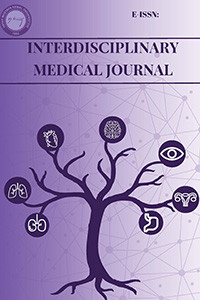SİSTEMİK RETİNOİD KULLANAN HASTALARDA İDRAR BULGULARININ DEĞERLENDİRİLMESİ
Giriş: Sistemik retinoid kullanımının yan etkileriarasında oral, nazal ve konjonktival mukozakuruluğu iyi bilinmektedir. Nazal mukozakuruluğuna bağlı burun kanaması sık görülen biryan etki olmakla birlikte üretral mukoza kuruluğunabağlı hematüri sadece bir olguda bildirilmiştir.Çalışmamızda sistemik retinoid kullanan hastalarınidrar bulgularının değerlendirilmesi amaçlanmıştır.Gereç ve yöntem: Çalışmamıza son bir yıl içindekliniğimizde orta ve şiddetli akne tanısı ile oralisotretinoin kullanan ve çeşitli nedenlerle asitretintedavisi verilen hastaların verileri retrospektifolarak tarandı ve tedavi sırasında tam idrar tetkikiyapılan 55 hasta çalışmaya dahil edildi. Hastalarınyaşları, kullandığı retinoik asit tipi, retinoik asitdozları, tam idrar tetkikinin yapıldığı tedavi ayı,diğer mukozal yan etkiler, laboratuvar tetkikleri vetam idrar tetkiki bulguları kaydedildi.Bulgular: Sistemik retinoid kullanan 19 erkek 34kadın hasta çalışmaya dahil edildi. Hasta grubununyaş ortalaması 23.2±10.4 yıl (10-64) idi. Kontrolgrubuna 19 erkek 21 kadın alındı. Kontrolgrubunun yaş ortalaması ise 24.6±5.7 yıl (15-40)(p>0.05) idi. Toplam 49 hasta isotretinoin, 6 hastaise asitretin kullanıyordu. Hastaların idrar analizisonuçları kontrol grubu ile karşılaştırıldığında idrarPH, idrar dansite değerleri, idrarda lökosit veeritrosit varlığı açısından fark belirlenmedi(p>0.05). İdrarda epitel varlığı retinoik asit kullanangrupta kontrol grubuna oranla yüksekbulundu(p<0.05).Sonuç: İdrarda epitel varlığının sistemik retinoidkullanan grupta yüksek oranda saptanmasıürogenital mukoza kuruluğu ile ilişkili olabilir.Bizim hasta grubumuzda altta yatan ürolojikpatoloji olmaksızın izole hematüri saptanmadı.Ancak bu konuda daha daha çok hasta ile yapılacakprospektif çalışmalara ihtiyaç olduğunudüşünmekteyiz.Anahtar kelimeler: Hematüri; sistemik retinoid;yan etki; idrar tetkiki bulguları
Evaluation Of Urinary Findings In Patients Using Systemic Retinoid
Introduction: It is well known that side effects ofsystemic retinoids especially mucosal dryness ofmouth, nose and conjunctiva. The nasal bleedingrelated nasal dryness is a common side effect of systemic retinoid. However mucosal dryness ofurethra related hemathuria reported with only onecase. In this study, we aimed to evaluate the urinanalyse findings of the patients who use systemicretinoid.Material and Method:The last year’s data of the patients who were usingoral isotretinoin for moderate to severe acne andoral acitretin for several dermatological diseasewere screened retrospectively. Fifty-five patientswho were examined for urin-analyse during retinoicacid treatment included to the study. Ages ofpatients, types of retinoic acid, dosage of retinoicacid, month of the retinoid treatment when urineanalyse examined; mucosal side effects, nailingrown were questioned. The laboratory tests andurin analyse findings, were recorded. Forty age andsex matched asymptomatic patients who wereexamined for urinalysis were randomly selected forcontrol randomly from hospital information system.Results: The 19 men and 34 women who wereusing retinoic acids were included to the study.Mean age of patients was 23.2±10.4years (10-64).The19 men and 21 women were taken as controlgroup. Mean age of controls was 24.6±5.7years(15-40)(p>0.05). The 49 patients were usingisotretinoin and 6 patients were using acitretin. Theresults of urinalysis of patients were compared withthe control group and the difference was notdetermined for the urine pH, urine density valuesand presence of leukocytes and erythrocytes inurine (p!0.05). The presence of red blood cells inthe urine associated with urinary tract infection in 4patients. The presence of epithelial cells in the urinewas higher in retinoic acid group compared to thecontrol (p <0.05).Conclusion: Higher ratios of epithelial cellspresence in the urine of retinoic acid using groupmay be associated with dryness of urogenitalmucosa. Isolated hematuria without underlyingurological pathology was not detected in our patientgroup. However, prospective studies of larger seriesare needed in this regard.
___
- McLane J. Analysis of common side effects of isotretinoin. J Am Acad Dermatol.2001
- Nov;45(5):S188-94.
- Allı N,Öge N. Dermatolojide retinoidler. Türkiye Klinikleri J Med Sci.1989;9(5):363-
- -
- Erpolat S, Gorpelioglu C, Sarifakioglu E. Isotretinoin associated anal fissureand rectal
- bleeding: a rare complication. Int J Dermatol. 2012 Mar;51(3):358-9.
- Sarifakioglu E, Yilmaz AE, Erpolat S. Terminal hematuria associated with oral
- isotretinoin treatment in a patient with acne vulgaris. Pediatr Dermatol.
- Sep;29(5):668-9
- Brito Mde F, Sant'Anna IP, Galindo JC, Rosendo LH, Santos JB. Evaluation ofclinical
- adverse effects and laboratory alterations in patients with acne vulgaris treated with
- oral isotretinoin. An Bras Dermatol. 2010 May-Jun;85(3):331-7.
- Oehlers SH, Flores MV, Hall CJ, Crosier KE, Crosier PS. Retinoic acid suppresses
- intestinal mucus production and exacerbates experimentalenterocolitis. Dis Model
- Mech. 2012 Jul;5(4):457-67.
- Mostow EN. Include discussions and review of systems regarding inflammatory bowel
- disease in patients starting isotretinoin therapy: comment on "Isotretinointherapy and
- inflammatory bowel disease". Arch Dermatol. 2011 Jun;147(6):729-30
- Rademaker M. Adverse effects of isotretinoin: A retrospective review of 1743patients
- started on isotretinoin. Australas J Dermatol. 2010 Nov;51(4):248-53.
- Vieira AS, Beijamini V, Melchiors AC. The effect of isotretinoin on triglycerides and
- liver aminotransferases. An Bras Dermatol. 2012 May-Jun;87(3):382-7.
